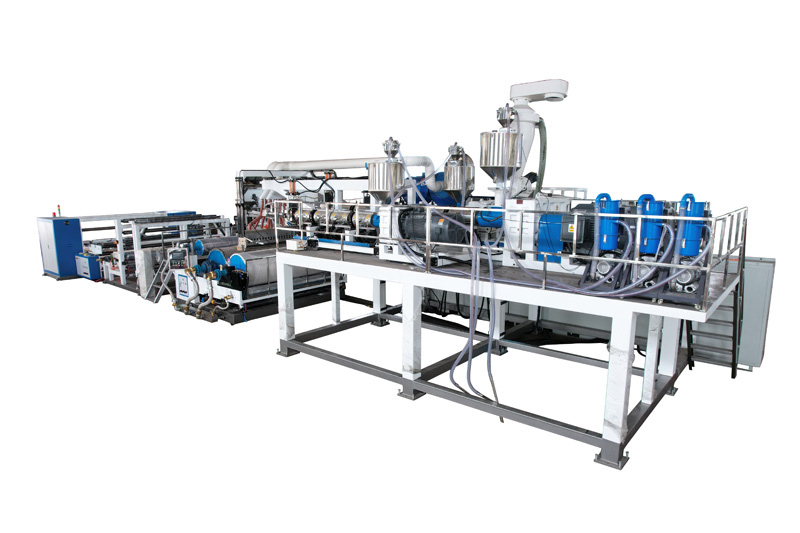Hygienic Material Cast Film Machine The Essential Role of Cast Film Machines in Hygiene Manufacturing Hygienic Material Cast Film Machine,Cast Film Extruder Machine,Cpp Cast Film Line,Pp Cast Film Machine Baijia Mechanical Equipment (Huizhou) Co., Ltd. , https://www.castfilmmachine.com
According to overseas media reports, the Singapore International Enterprise Development Bureau recently stated that Singapore companies absolutely have the conditions to enter the international auto parts market. After actively developing electronics, biotechnology, and aerospace industries, Singapore plans to compete for the auto parts market in the future. Singapore's Enterprise Development Bureau's monthly issue of "iejournal" reports on the overview of Singaporean companies entering the global automotive market. The Enterprise Development Agency believes that Singapore’s corporate sector involves electronics, data storage, biotechnology and aerospace industries. Singapore companies have reached a strict level in these areas, laying a solid foundation for entering the automotive industry. The Enterprise Development Council stated that Singapore itself does not have a car manufacturing industry, but it has an advantage in developing local automobile support and auxiliary industries. According to the report, due to the lack of a domestic market in Singapore, the auto parts industry must compete internationally. Previously produced auto parts have also been sold to internationally renowned car dealers. The Enterprise Development Agency believes that automobile manufacturers have been moving away from traditional production bases (such as the United States, Europe, Japan, and South Korea) in recent years, and have turned to China, Thailand, Malaysia, and Indonesia to produce cars. This provides good opportunities for Singapore companies to provide parts and support services to global automakers.
In today's hygiene product manufacturing, a machine silently makes all the difference; this is the "Hygienic Material Cast Film Machine". Unseen by many, they are the backbone of the industry, churning out essential films that are part of various hygiene products we rely on every day.
Simple Insights into Hygienic Films:
These hygienic films might be thin and go largely unnoticed, but they're necessary for our health and hygiene products. They're made from materials like cast polypropylene (CPP) or breathable polyethylene (PE) and rely on a process known as cast film extrusion. This is where the precision of the "Cast Film Extruder Machine" comes into play, melting plastic down and forming it into wide, flat sheets, which are then cooled, set, and prepared for use.
The films coming off the line from the "Hygienic Material Cast Film Machine" have to be strong enough for repeated use, stay clean and free of bacteria, safe for touching skin, and may need other properties like being breathable, tear-resistant, or even reduce noise depending on how they will be used.
The films made by the "Hygienic Material Cast Film Machines" find their way into many products. Our range, including the likes of "Cpp Cast Film Line" and "Pp Cast Film Machine", produces films such as:
CPP Film: It's cost-effective and versatile, making it great for items such as diapers and personal care wipes.
Breathable PE Film: It lets air in but keeps liquids out - vital for the backs of adult and baby diapers.
Non-Woven Laminated Film: This combines the strength and water resistance of cast film with the soft touch of non-woven fabrics, perfect for the top layer of diapers and similar items.
Choosing the Right Machine for Manufacturing:
When picking out a "Hygienic Material Cast Film Machine" for your production line, take into account:
The type of film you need to produce.
The amount of film you need to make.
The properties your end-product must have.
Focusing on Reliable Quality:
For manufacturers in the hygiene industry, "Hygienic Material Cast Film Machines" are a key piece of equipment. Knowing what they do and the different types of films they can produce helps ensure that hygiene products meet the high-quality standards and the need for innovation in the market.
PLA biodegradable cast film can be quickly and naturally decomposed under certain conditions, which is an inevitable trend in the future development of flexible packaging and is widely used as printing materials.
Materials, packaging materials, food daily chemical soft packaging materials, biodegradable coated paper, clothing packaging, etc.
1 PLA is a polymer composed of small lactic acid units (polylactic acid). Lactic acid is an organic acid that plays an important role in our daily life. we flat
The yogurt or anything with glucose can be converted into lactic acid, and the lactic acid of PLA consumables comes from corn, and the starch raw material extracted from corn
material made.
|The degradable film not only has the functions and characteristics of traditional plastics, but also can pass through the action of microorganisms in soil and water or through
The role of ultraviolet rays in the sun, split and degrade in the natural environment, and then re-enter the ecological environment in a reduced form, returning to nature. Domestic research
The varieties developed have covered photodegradation, photobiodegradation, photooxidative biodegradation, high starch content biodegradation, high calcium carbonate filled photooxidative degradation,
Fully biodegradable, etc. Among them, edible film and water-soluble film are more commonly used.

May 22, 2024